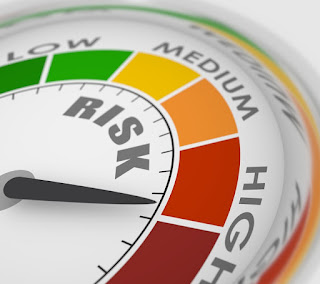Some scenarios could be life changing events that affect the entire planet but they are thankfully highly unlikely to occur.
The vast majority of emergency situations are short term, but even extreme events like hurricanes quickly pass and help will be on it's way to you.
So it makes sense to prepare for the short term disruption events first and for most of us that means you won't need a nuclear bunker.
The first five things you should do as a prepper are easy, and most importantly free!
Step one: Risk Assessment
Properly assess your situation and the risks you may face, think about how likely are they to happen and what measures should you take to mitigate the effects when they do.
How would you cope with a loss of a utility supply like power, water or gas?
Are there risks due to your location, is it liable to earthquakes, flooding, volcanic activity or extreme weather?
Are you prepared for a loss of income if you become ill or injured and couldn't work for a while, or lost your job?
Step two: Make a bug out bag
In the vast majority of scenarios you will not need to leave your home but you should pack a bag of overnight essentials in case you have to leave in a hurry.
To begin with it doesn't have to be all encompassing for you to set up a backwoods homestead.
Start basic, spare clothes, toiletries and some snacks and water will do for an impromptu overnight trip should your neighbours house catch fire and you need to evacuate in a hurry for example.
Over time you will add to this with power banks, first aid kits etc as and when you decide you can buy them and you can even buy complete bug out bags on eBay and Amazon like this;
Step three: Start to stockpile
Increase the amount of food you keep in your home, this can be done gradually over time and by taking advantage of bulk purchases it actually saves you money in the long term.
You don't need to spend a fortune buying expensive freeze dried ready meals.
There are many foods that can be stored for several years in the packaging you buy them in without you having to buy any extra equipment or containers.
Buy food you would normally eat, that way you can rotate your supplies to maximise its storage life.
Over a short period of time you will quickly build up your stockpile from a few days supply of food and water to enough to last weeks, months or years.
Step four: Raise awareness
The more prepared a community is before an event occurs the better it will be able to deal with it when it happens.
Most of prepping is things that everyone used to do until relatively recently, sadly common sense is now not so common.
Talking to your family, friends and neighbours about potential risks might help them but it could also help you as they might have thought of things you have overlooked.
Step five: Re-evaluate
Colonel John "Hannibal" Smith from the A-Team might love it when a plan comes together but no plan is perfect and you should regularly reassess your situation and preparations.
Once you have built up your stockpile you could move on to learning how to grow or hunt your own produce.
Your bug out bag can be improved to accommodate longer periods away from home or even develop into an INCH (I'm never coming home) bag if you feel you need it.
Ask yourself what new skills do you need to learn to be more self reliant? How to increase what you produce for yourself?
Take care
Roo











No comments:
Post a Comment